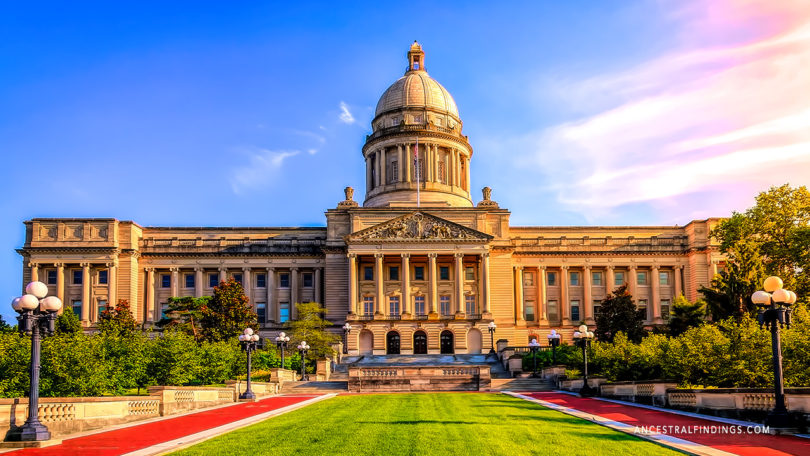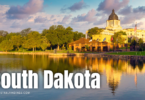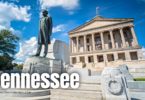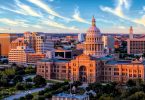The capital of the state of Kentucky is Frankfort. The city is also the county seat of Franklin County, Kentucky. It has a population of about 27,000 people, which makes it the fifteenth-most populous city in Kentucky. The city is located along the Kentucky River, and is the primary city of the Frankfort Micropolitan Statistical Area; this area includes Anderson and Franklin Counties. This micropolitan area is the fourth most populous in the state.
The city obtained its name because of an incident in the 1780s involving a raid by local Native Americans on a group of early European settlers to the area. These settlers from the east were making salt at a ford along the Kentucky River, when one of them, a man named Stephen Frank, was killed by the Natives. The other settlers began calling their new settlement Frank’s Ford, which later became blended to Frankfort.
A man named James Wilkinson purchased a 260-acre tract of land on the north side of the Kentucky River in 1786. He developed this tract of land as the downtown area of Frankfort. He was also one of the early proponents of Frankfort as the capital of Kentucky.
Kentucky achieved statehood as the fifteenth US state in 1792. After this, five commissioners from various Kentucky counties were appointed to choose a location for the state capital. These commissioners were John Allen, John Edwards, Henry Lee, Thomas Kennedy, and Robert Todd. There were a few towns that were competing for the honor of being the state capital, and Frankfort won. An offer from the town to the commission that included resident Andrew Holmes; log cabin to use as the capitol building for seven years, several town lots, $50 worth of locks and hinges, ten boxes of glass, 1,500 pounds of nails and $3,000 in gold was instrumental in Frankfort being chosen as the state capital city.
There was a US post office in Frankfort by 1794; Daniel Weisiger was named the first postmaster there. He sent his first quarterly account to Washington, D.C. in October of that same year.
A lawyer and statesman from Virginia named John Brown built a house in Frankfort in 1796 that is today called Liberty Hall. Before Kentucky achieved statehood, John Brown represented Virginia at the Continental Congress during the Revolutionary War, and also in the US Congress from 1789 to 1791. When he was in Congress, John Brown introduced the bill that granted statehood to Kentucky. After Kentucky achieved statehood, he was elected to the US Senate by the Kentucky state legislature (this was in the days when state legislatures selected US senators instead of American voters).
The same year John Brown built his house in Frankfort, the Kentucky General Assembly voted to provide funds to build a house in which the state’s governor would live. It was finished two years later. The Old Governor’s Mansion of Kentucky is said to be the oldest governor’s mansion still in use in the United States.
The Old Capitol of Kentucky was designed in 1829 by Gideon Shyrock. The Greek Revival building was actually Kentucky’s third capitol building, but the only one that is still standing today. The building served as Kentucky’s capitol building for eighty years.
A nearby settlement called South Frankfort was annexed by Frankfort in 1850, making the town into a city. The popular periodical “The Argus of Western America” was published in Frankfort from 1808 to 1830.
During the Civil War, the army of the Union built fortifications that overlooked Frankfort on a patch of land that is today called Fort Hill. The Confederate Army also occupied Frankfort for a brief period of time during the Civil War. It was the only time during the war that the Confederate Army took control, even however temporarily, of a Union state capital.
In 1900, the Governor-elect of Kentucky, a man named William Goebel, was assassinated while he was walking to the capitol building to attend his inauguration. The former US Secretary of State Caleb Powers was found guilty later of being part of a conspiracy to assassinate William Goebel.
The city of Frankfort became a healthy, busy city, and continued to grow over the decades, especially during the 1960s. There was a modern addition to the State Office Building that was done in 1967. The original State Office Building was built in the 1930s on the site of the former Kentucky State Penitentiary. Some stones from the walls of the old penitentiary were used in the walls that were built to go around the office building.
The Capitol Plaza was also built in the 1960s. The Plaza includes the Capitol Plaza Office Tower (which is the tallest building in Frankfort), the Capitol Plaza Hotel (formerly a Holiday Inn hotel), and the Fountain Place Shoppes. The Capitol Plaza Office Tower opened in 1972 and has since become a prominent visual landmark for Frankfort, is located in the center of the city.
By the early 21st century, the buildings of the plaza had fallen into disrepair because of the neglect of exterior maintenance of them. Sections of the plaza had to be closed to pedestrians because of concerns about their safety. City officials recommended in 2008 that the Tower be demolished and that the plaza area be redeveloped over several years. In 2018, the demolition of the Tower was completed, and the event was televised and live-streamed on Facebook. That same year, the convention center in Frankfort was also demolished (it had been built in 1971).
The city is the home to several large and important businesses including the Kentucky Bourbon and Buffalo Trace distilleries.
The city of Frankfort is a large, busy, and important city today. Going from its pioneer/frontier origins to its place as a busy metropolis took a couple of centuries, but Frankfort is now an important American city that contributes to state tourism, as well as the state and national economies in a positive and beneficial way.





